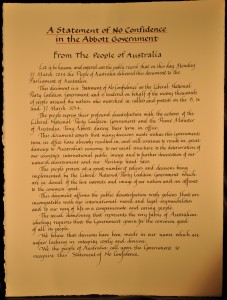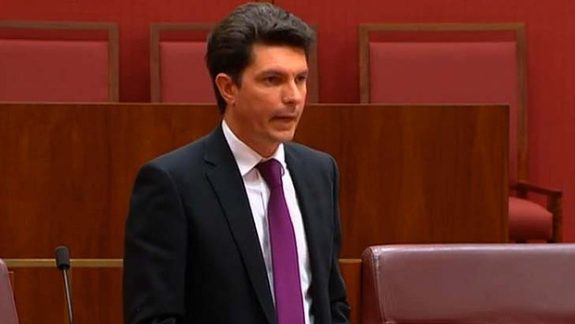What do our politicians do?

What, exactly, do our politicians do?
Today, Monday 18 April 2016, the Turnbull government took the almost unprecedented step of recalling all of Parliament for a three-week “emergency sitting” to debate and pass – or, hopefully, fail to pass – two specific pieces of legislation.
Much has been written about the government’s real motivations behind this recall and debate. With the repeated defeat of the ABCC “productivity” bill, Malcolm Turnbull has his double dissolution trigger. But before the vote, with its commonly expected outcome, the Senate spent a large portion of the day discussing the bill.
I had the pleasure of listening to Senator Scott Ludlam’s speech on the subject. Senator Ludlam’s speeches are almost always worth listening to – go on, listen to one or two right now, we’ll wait.
If you just took the opportunity to watch some of Ludlam’s speeches, or have previously done so, beside the clear speaking, reliance on facts and withering irony that he brings to his every contribution, the other notable feature of Scott Ludlam’s speeches is that the chamber is almost invariably almost empty.
It would seem fair to assume that on a matter of such national importance that Malcolm Turnbull would spend hundreds of thousands of dollars to bring “nearly 150 MPs and their staff… back to Parliament from around the country”, that said MPs would want to listen with avid attention to the speeches in response. Presumably the job of an MP is to attend sittings of Parliament, engage in the discussions and debate there, and form an opinion on the subject at hand prior to casting their vote.
One might make that assumption, but one would evidently be wrong. Any cursory viewing of either Parliament or the Senate will show the real situation – wide swathes of benches, primarily governmental and opposition, clear of occupants. That is, until the bells are rung for a vote.
Debates in the Parliament and the Senate, it seems, exist for the sake of posterity and inclusion in Hansard, not to inform the level of understanding of those about to decide on the future of the country. Is it any wonder Question Time so often descends into farce? The stakes are so low, with all – or at least most – MPs already set in their intended vote, that they need to pass the time somehow. The result is a system of government too easily interrupted by process – filibusters, suspensions of standing orders, points of order, and political games such as tying unpalatable bills to legislation of clear national and popular importance, forcing MPs to vote against the good to prevent the bad, or to vote for the bad to achieve the good.
So if they’re not spending their time in their seats in the Chamber, what do our politicians do?
They don’t write their own articles.
They don’t even fact-check, or apparently have very much knowledge about the subject matter of their portfolio. Scott Ryan’s recent snafu with plagiarism is only the most recent of a continual string of egregious failures. Sometimes it seems that if politics were a school class, most Australian politicians would get a failed grade on account of not bothering with even the most rudimentary editing of their copied work.
They don’t rely on expert witnesses.
Greg Hunt, apparently the closest thing the Coalition has to a climate expert, went no further in his research than to visit a wikipedia page. Relying on Wikipedia would bring a failing grade for a student’s essay; why should we accept it from our elected leaders?
They don’t appear to have much knowledge of party processes that fall into their direct remit.
Nor do they seem to take an active involvement in running the companies of which they are the directors. Sometimes it appears that politicians spend more time disavowing any knowledge of things happening in their own department than it would have taken to simply be aware in the first place. It helps that they seem to have such fallible memories. Even if they know something now, they almost certainly won’t know it by the time it becomes the subject of an inquiry. This is a peculiarly specific talent that seems unique to our politicians.
What our politicians do appear to spend plenty of time doing is sledging. Almost every federal politician in Australia, a refined product of the political system, is well-versed in holding the party line, spouting off talking points and heckling during whatever speeches they don’t manage to avoid being present for. Some might consider these to be lower-order priorities than the activities that might actually lead to better legislation.
It’s not as if we don’t pay our politicians enough. Even the most obscure of backbenchers [not] sitting in the pews at the back of the chamber is earning six figures – twice. If you’re reading this, almost certainly every federal politician earns more than you by a number of multiples. It has been said that “if you pay peanuts, you get monkeys”, as if that were a defense of exorbitant parliamentary salaries, but research has shown that the benefits of lifting politicians’ pay start to even out once the level of remuneration reaches a comparative middle class wage. Middle class wage is approximately the average full-time wage, or just under $81,000. Clearly we pay above the curve. Politicians and economists are wont to point out that if you pay less, you won’t attract the people you want into politics, or keep them there. Amanda Vanstone has argued that Australian politicians earn much less than company directors and others in big business. This brings us to the corollary. If you pay peanuts, you get monkeys; if you pay a corporate salary, you get businessmen. Oddly, people rarely seem to question whether businessmen make the best politicians.
So, whilst Parliament and the Senate spend the next three weeks in Canberra having already voted down the extremely critical piece of legislation the Government absolutely needed to have passed, just remember they’re earning a bare minimum of $11,483 for their efforts. And keep that number in mind when you see pictures of empty seats. You’re paying for them to not be sitting there.











